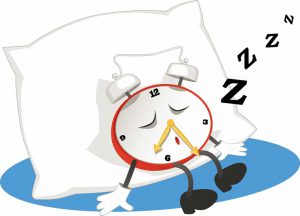 Your circadian rhythm affects your sleep patterns and sleep affects you in a big way. It affects you physically, mentally, and emotionally. If you don’t sleep well, you’re sluggish and moody the next day. If you do sleep well, you are energetic and happy. In his last blog, your Livonia, MI dentist, Dr. James Stewart touched on your biological clock and circadian rhythm. In today’s blog he delves deeper into both, explaining their role in sleep.
Your circadian rhythm affects your sleep patterns and sleep affects you in a big way. It affects you physically, mentally, and emotionally. If you don’t sleep well, you’re sluggish and moody the next day. If you do sleep well, you are energetic and happy. In his last blog, your Livonia, MI dentist, Dr. James Stewart touched on your biological clock and circadian rhythm. In today’s blog he delves deeper into both, explaining their role in sleep.
Circadian Rhythms
Your Master Clock
An area in your brain called the suprachiasmatic nucleus (SCN) is the master clock that controls your circadian rhythms. It also regulates the production of melatonin, a hormone that induces sleep. The SCN is located just above the optic nerve center in your brain.
Circadian Rhythms
Based primarily on daylight and nighttime darkness, circadian rhythms induce mental, physical, and behavioral changes that follow a 24-hour cycle.
Circadian Rhythm vs the Biological Clock
Your biological clock consists of a group of molecules located throughout the cells in your body. These molecules interact and drive your circadian rhythm. Your “master clock” helps keep all your body clocks synchronized.
How Are Circadian Rhythms Produced?
Circadian rhythms are produced naturally within the body but are influenced by your environment. For instance, light triggers certain genes that affect your internal clocks.
Bodily Functions and Your Health
Your circadian rhythms affect important bodily systems including body temperature, hormonal functions, and sleep cycles. Commonly linked to sleep disorders including insomnia, they have also been associated with other health issues including diabetes, depression, bipolar disorder, seasonal affective disorder, and obesity.
Circadian Rhythms and Sleep
Because the SCN, your body’s master clock, is located near the optic nerve center, it receives information regarding the changes in light as day progresses. As light fades and darkness falls, the SCN signals your brain to produce melatonin which helps make you drowsy and put you to sleep. If your circadian rhythm or one of your other body clocks is disrupted, sleep disorders can occur.
About Dr. Stewart
James R. Stewart, Jr, DDS, PC and our compassionate staff proudly serve patients of all ages from Livonia, Farmington Hills, Plymouth, Northville, Dearborn Heights, Garden City, and all surrounding communities. If you think you or a loved one is dealing with a sleep disorder, call our office today at (734) 425-4400, to schedule an appointment. At Dental sleep Medicine of Michigan, we are committed to forming trusting relationships with our patients so we can work together to achieve sound treatment and a future full of restful nights.






